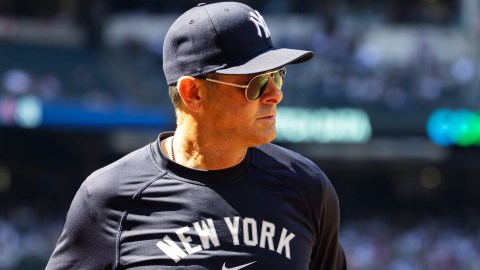There's no easier target for public criticism these days than Mark McGwire.
Calling out baseball's former stars for their role in the Steroid Era is a piece of cake. A walk in the park. Shooting fish in a barrel. Tee ball.
McGwire, Sammy Sosa, Barry Bonds, Roger Clemens — they're all easy targets for a generation of baseball stars who are calling out the game's biggest names for assaulting baseball's integrity.
That generation is the last generation. Criticism of the Steroid Era is making headlines every day, but it's baseball's old-timers who are doing the talking. Carlton Fisk, Cecil Fielder and Goose Gossage are among the big-name players coming out and speaking out against the spread of PEDs in baseball. The only people decrying the Steroid Era are the ones very much removed from it.
Fisk blasted McGwire and his ilk in a Chicago Tribune report last week, blaming them for abusing not only the integrity of baseball, but the laws of his country.
"It's been a federal offense for a long time, regardless of whether baseball was recognizing it and putting rules into place," Fisk said. "The people who did it … they were breaking the law to start with. It doesn't have to be a baseball law. They knew what they were doing and the reason they were doing it. Now they are sorry because they are getting called out."
Fielder called McGwire out for lying about the effects of his steroid use. McGwire claimed that the 'roids weren't helping him pile up gaudy power numbers; Fielder wasn't having it.
"I'm not going to buy that at all," he said. "I just don't think that Mark, as a guy that I played against my whole career, and a guy that was the starting first baseman for a lot of those All-Star teams — a few of them that I didn't make … I just can't buy that. I can't buy the fact that he or anyone else who's used substances doesn't believe that it bettered their careers, bettered their numbers."
Gossage went even further. Not only did he agree that steroids inflated the players' numbers, but he called users "cheaters" and called for their banishment from the Hall of Fame.
"I definitely think that they cheated," Gossage told the Associated Press earlier this month. "And what does the Hall of Fame consist of? Integrity. Cheating is not part of integrity."
All of these players, past legends of the game, make sound points. They all have profound things to say about the state of the game after a decade of corruption. But they're all players from the pre-steroid era in baseball — they rose to fame in the 1970s, 80s and early 90s. None of them saw the rise of performance-enhancing drugs firsthand.
Their opinions are relevant. These are still men who spent their lives around baseball culture and they understand the way the game is played. But they weren't down in the trenches experiencing the pressures and the temptation of steroids. They weren't living in the moment.
McGwire and many of his ilk have said that they regret playing in the Steroid Era. They've tried to blame the era, not their own personal decisions, for what happened in their pasts. And many, including Fisk, Gossage and Fielder, aren't buying that argument.
But why shouldn't they? It was an era in which, if you believe Jose Canseco, 80 percent of major league players were juicing. When players like Alex Rodriguez say it was part of the culture, they're really not kidding. Drug use had become a way of life.
No one really believes that 80 percent of baseball players were bad guys. They weren't morally corrupt individuals, hell-bent on destroying the integrity of the game. They were just caught up in a corrupt culture.
It's easy to say that steroid users were cheaters, that they inflated their numbers artificially, that they disgraced the game. But maybe that's too simplistic a view. Maybe McGwire and his colleagues really were a product of their era. It's not that far-fetched.
What we have is a struggle between eras. The players of the previous generation are attacking the steroid users who corrupted their great game. The players of today just want to be forgiven.
It doesn't have to be this way.
Baseball doesn't have to be a war between the generations. What's best for the game, in fact, would be to forgive, forget and move on. What good does it do to attack the players who were heroes to a generation of baseball fans?
McGwire, along with Sosa of course, saved baseball a decade ago. Their dramatic home run race in 1998 rejuvenated a fan base that had been disillusioned by labor disputes and rising ticket prices. When the fans faded away, it was McGwire who brought them back.
And now there are players trying to turn those same fans against him?
Steroids or not, these men are a part of the game's history. They were part of a corrupt era in baseball, but they deserve our forgiveness.



